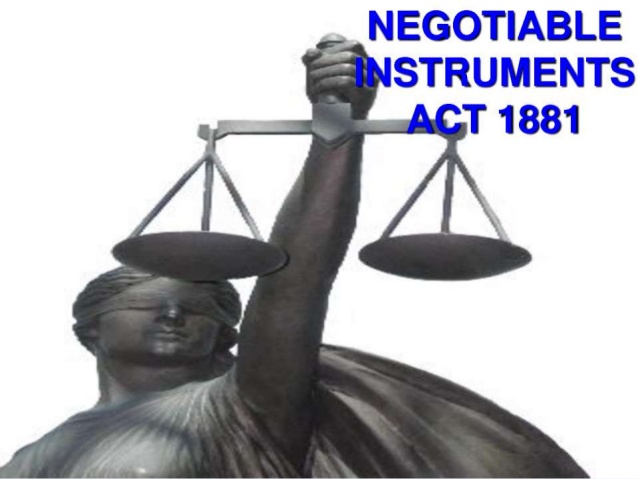Introduction
Welcome to the official blog of the Law Offices of Kr. Vivek Tanwar Advocate and Associates, where we are dedicated to providing litigation support services for matters related to the Negotiable Instruments Act, 1881. In today’s blog post, we aim to shed light on the prevailing issues surrounding the Negotiable Instruments Act, 1881, the legal framework in place for their protection, and the steps we can take as a society to combat these acts. Join us as we explore this critical subject and empower you with the knowledge to protect your rights and safety.
A negotiable instrument is a written document guaranteeing payment at a set time, identifying the payer. Governed by the 1881 Negotiable Instruments Act, it includes promissory notes, bills of exchange, and cheques, but not Oriental instruments like hundies. The Payment and Settlement Systems Act of 2007 introduced electronic payment methods, NEFT and RTGS.
Key features of negotiable instruments include transferability, independent title, presumptions, the right to sue without notifying the original debtor, and the need for clear payment terms. For example, promissory notes, defined in Section 4 of the 1881 Act, must contain an unconditional promise to pay a specific sum to a designated individual or bearer, along with signatures, no conditions, and immediate or specified repayment terms.
Holder:
A “holder” possesses a negotiable instrument like a promissory note, bill of exchange, or cheque, acquired through transfer, endorsement, or delivery. Holders have rights, including the right to receive payment when due and to sue parties liable for dishonour. They can also sue prior parties. If acquired in good faith and for consideration, a holder may become a “holder in due course,” with added privileges and protections under the Negotiable Instruments Act, 1881.
Holder in due course
A person who has acquired a negotiable instrument in accordance with good faith and in exchange for something of value is known as a “holder in due course.” It’s important to note that every holder of a negotiable instrument is essentially considered a “holder in due course” by default. In the event of a dispute regarding the legitimacy of the holder, it becomes the responsibility of the party liable for repayment to provide evidence that the person in possession of the negotiable instrument does not rightfully own it.
However, the burden of proof, which is the obligation to demonstrate specific facts in a legal context, falls on the holder in cases where the parties are obligated to repay the claim that the negotiable instrument was acquired from its rightful owner through illegal means or coercion. To establish their status as a holder in due course, the holder must provide evidence that they acquired the negotiable instrument in good faith and in exchange for something of value. This requirement to prove their rightful status is an integral aspect of legal proceedings.
Difference between holder and Holder in due course
| Aspect | Holder | Holder in Due Course |
| Definition | – Any individual with the legal right to possess a promissory note, bill of exchange, or cheque in their name. – Entitled to receive or obtain payment from the parties involved. | – A holder who accepts the instrument in good faith, with due care and prudence, for value (consideration), and before maturity. – Possesses the same rights as a holder but with added protections. – Must acquire the instrument before it matures. |
| Payment Requirement | – Payment is not essential for a holder. – Can purchase the instrument after it matures. | – Payment is not essential for a holder in due course. – Can purchase the instrument after it matures. |
| Specific Rights | – A holder does not have any specific rights. | – A holder in due course has certain specific rights. – Cannot use the argument that the amount on the instrument exceeded the authority granted. |
| Legal Custody | – Must have legal custody of the instrument in their name. – Entitled to obtain or recoup the sum. | – Must have legal custody of the instrument in their name. – Entitled to obtain or recoup the sum. |
| Examples | – Endorsee, payee, or bearer can be holders. | – Endorsee, payee, or bearer can also be holders in due course. |
| Title Superiority | – A holder does not receive a title superior to their transferor. | – A holder in due course receives a title superior to their transferor. |
| Equities and Defenses | – A holder in due course’s title becomes free from all equities. – Cannot raise defences that can be raised against prior parties. | – A holder in due course’s title becomes free from all equities. – Cannot raise defenses that can be raised against prior parties. |
| Example Scenario | – If a negotiable instrument is lost and found by someone through criminal activity (theft), the person does not have rights regarding any money owed. | – If the same document is properly transferred to a person as a holder in due course, they will have a good title. |
Conclusion
The 213th Law Commission Report highlights a substantial backlog in the Indian judicial system, including around 20% involving cheque bounces. Recent amendments aim to revitalize dormant sections of the 1881 Negotiable Instruments Act. Despite being criminal cases, provisions for bail have made them resemble civil matters, enabling summary judgment procedures. These new restrictions aim to protect cheque integrity, requiring accused parties to deposit a substantial sum, fostering seriousness. While progress is made, ensuring the viability of cheque bounce cases and meaningful summary trials remains essential to retain the criminal nature of the offence.
We are a law firm in the name and style of Law Offices of Kr. Vivek Tanwar Advocate and Associates at Gurugram and Rewari. We are providing litigation support services for matters related to the Negotiable Instruments Act, 1881.

